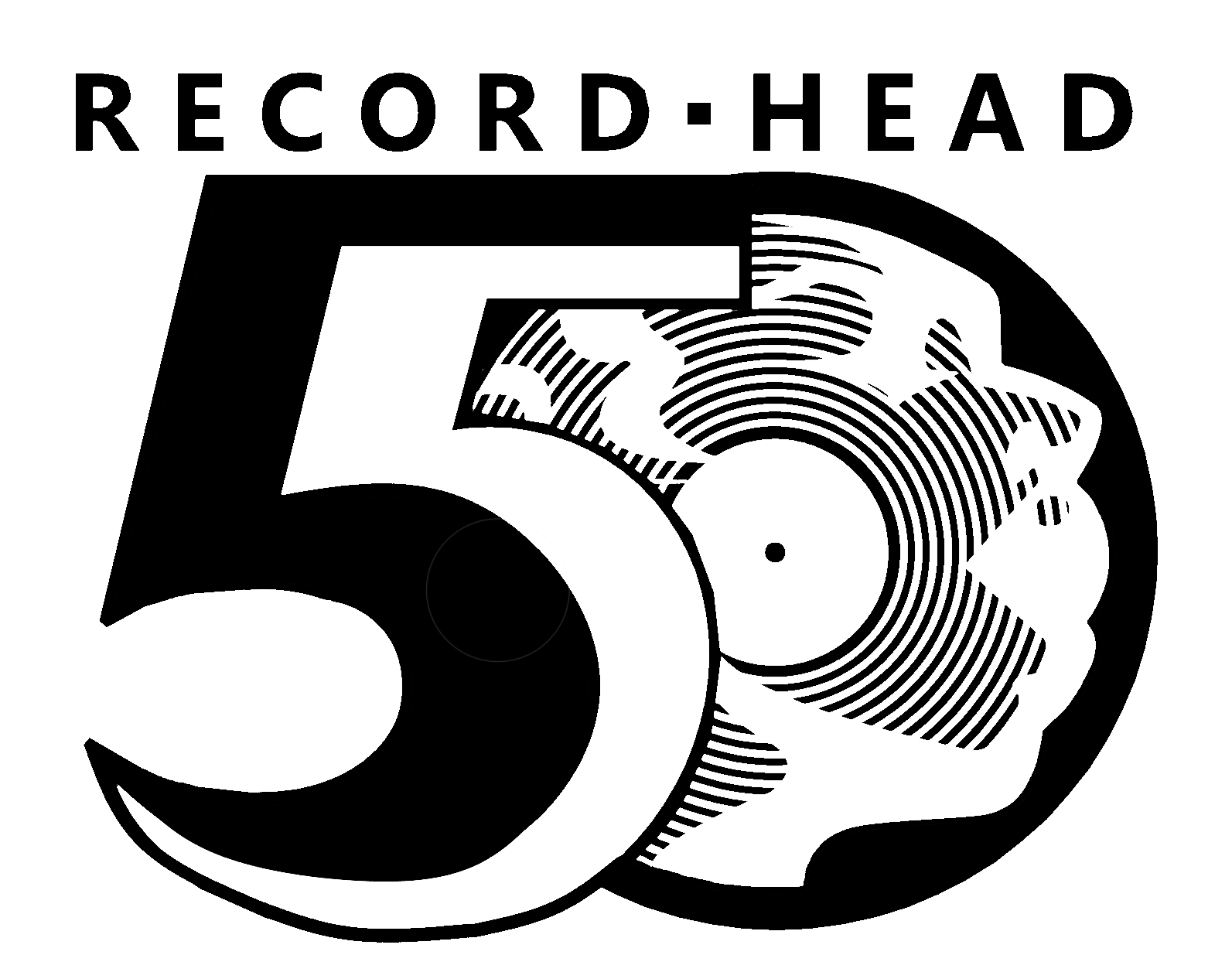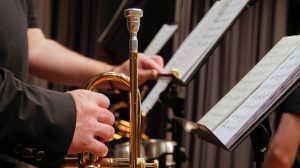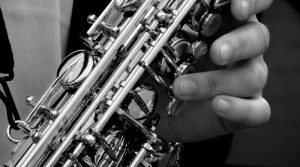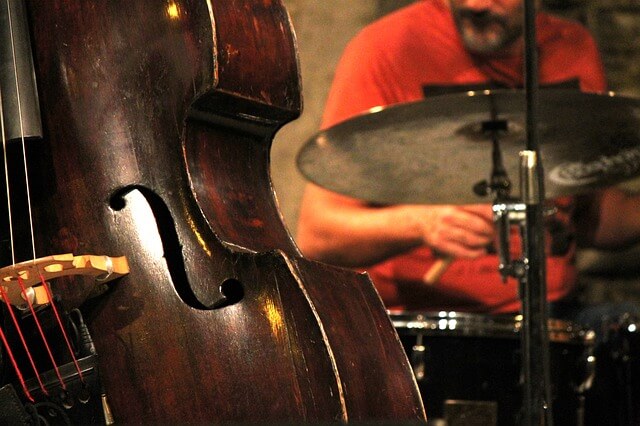
Playing a musical instrument is fun — you get to express yourself through sound, make music with friends, and maybe even perform at local coffee shops or bars. Learning an instrument also offers benefits for your mind, health, and overall well-being. The benefits of playing an instrument on the brain include increased intelligence, better memory, and improved coordination.
If you’re still wondering why you should learn to play an instrument, this article gives you 10 great reasons to start learning a musical instrument today.
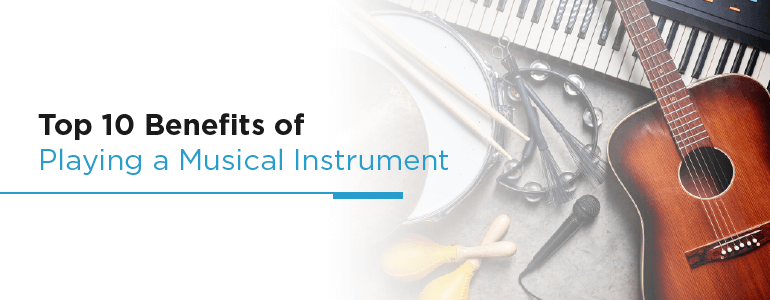
1. Improves Brain Function
One of the best benefits of learning a musical instrument is that playing an instrument increases intelligence. Playing an instrument can boost your smarts by improving executive functions (EF) in the brain. EF are high-level cognitive abilities associated with various leadership and academic skills — high levels of EF allow a person to process and retain information more quickly, regulate reckless behavior and make better decisions. EF skills also correlate with better strategizing, planning, and problem-solving.
People with high EF ability can respond better to changing situations and address new tasks more effectively. They often pay close attention to details and can balance both the mental and emotional aspects of a problem or situation. Many times, executive functions indicate high academic performance and achievement — you’ll likely find those with excellent EF skills at the top of their graduating class, serving in leadership roles or running a company from the corner office.
A 2014 study by the Boston Children’s Hospital revealed both children and adults could improve their executive functions and cognitive skills through musical training. Adult musicians showed better cognitive flexibility and memory, and children with musical training also showed faster processing speeds and increased activity in many other brain regions associated with executive functions. Musically trained children could also switch between tasks more effectively than children who did not play a musical instrument.
2. Improves Brain Connectivity
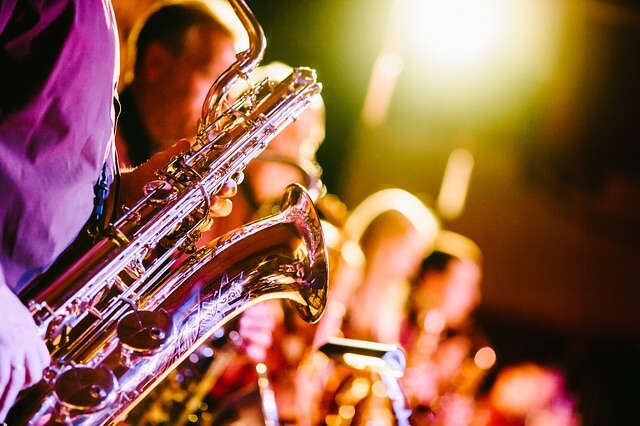 Another benefit of playing a musical instrument on the brain is increased connectivity between distinct regions of the brain. When you listen to music, it activates many different areas of the brain at the same time — your brain must break apart what you are hearing to identify different melodies and notes and then put it back together again to create a unified musical experience. When you play music instead of merely listening, this experience becomes even more enhanced.
Another benefit of playing a musical instrument on the brain is increased connectivity between distinct regions of the brain. When you listen to music, it activates many different areas of the brain at the same time — your brain must break apart what you are hearing to identify different melodies and notes and then put it back together again to create a unified musical experience. When you play music instead of merely listening, this experience becomes even more enhanced.
Playing a musical instrument activates almost every part of your brain at once, including both motor and sensory regions. You engage your fine and gross motor skills as you move your fingers over the keys of a clarinet or strum out a melody on a guitar. You activate your auditory cortex when you listen to the sound you produce and make adjustments for tone and harmony. As you read sheet music, the visual regions of your brain light up and tell your hands and mouth what to do next.
While all this action is happening, your brain is also receiving and processing emotional responses from the audience and your fellow band members. Playing a musical instrument is basically a full-body workout for the brain, and as you continue to develop your musical abilities, you strengthen your brain at the same time.
Playing an instrument has also been shown to build stronger connections between the right and left hemispheres of the brain. A study published in the Journal of Neuroscience showed increased connectivity in the corpus callosum of musicians who trained early in their life. Improved connection between the two hemispheres results in better reasoning and problem-solving skills because the brain can process information more quickly and using more diverse paths in the brain. That also allows musicians to tackle problems more creatively. So, does playing an instrument make you smarter? Evidence shows that it is quite possible playing a musical instrument does make you smarter.
3. Increases Memory Function
Improved brain function and connectivity from playing a musical instrument can also impact a musician’s memory functions. When your brain has strong and diverse connections, it can create and store memories more effectively by giving each memory multiple tags. For example, a musician’s brain may mark a single memory with auditory, visual, and emotional tags. They can later retrieve that memory through any or all of these paths, resulting in faster and more efficient memory recall.
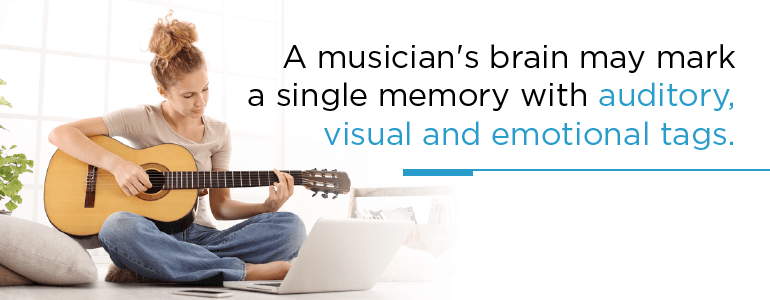
As a budding musician practices scales and learns fingerings for notes, they exercise their memory and strengthen it even more. This improved memory function can benefit musicians down the road by reducing memory loss later in life. Older adults with musical training often see less cognitive decline and better memory function as they age. Another benefit of playing a musical instrument for the brain.
4. Develops Perseverance
Why play a musical instrument? You might be surprised to learn the benefits of learning a musical instrument also extend beyond the brain to improvements in habits and values. Learning a new instrument takes practice, and practice builds patience. When you first sit down at a piano, your fingers will slowly and clumsily move over the keys. For weeks and weeks, it may seem like you are barely making any progress at all. However, through dedicated practice, you will eventually find your hands gliding over the piano, gracefully and effortlessly, as you perform at your first recital.
The early stages of learning an instrument are often the hardest — new players must hold their hands and arms in unfamiliar ways and contort their lips into unusual shapes to make a sound come out of a trombone or clarinet for the first time. After achieving a decent sound, they must then learn dozens of fingerings for different notes, as well as how to read music, tune and clean their instrument, and many other factors of being a musician.
Those who stick it out through the initial learning curve and remain devoted to regular practice can become talented musicians and more patient people. Musicians also continue to improve their patience and perseverance throughout their musical career as they tackle difficult pieces and learn new techniques. Although drilling scales and practicing tricky runs over and over can be monotonous, it certainly develops a person’s drive and discipline.
5. Improves Concentration
Along with increased patience, playing a musical instrument can also improve your concentration. When reading from sheet music, players must pay close attention to each note on the page, as well as watch for changing key signatures, time signatures, tempo markings, repeat signs, and more. If a player loses concentration while performing a piece, they will suddenly be six measures behind the rest of the band and playing in the wrong key.
Musicians must remain actively engaged when playing an instrument, which trains their focus and concentration. Practicing proper concentration when learning and playing a musical instrument can then transfer over into your everyday life — you’ll find yourself concentrating better in school or at work, too.
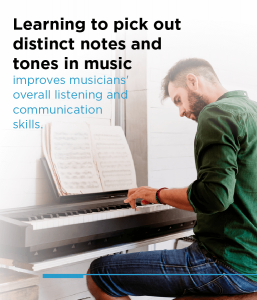
6. Improves Listening Skills
Playing a musical instrument requires excellent listening skills. Players must listen carefully to their instrument to make sure they stay in tune and produce a good sound, as well as pay attention to the rest of the band to stay on the beat and in harmony with other players.
Learning to pick out distinct notes and tones in music improves musicians’ overall listening and communication skills. Musicians can connect sounds to meanings more effectively and pick out words better in noisy environments. These improved listening skills are particularly beneficial later in life. While many older adults struggle to distinguish speech clearly against background noise, those who have trained as musicians earlier in life can hear and communicate more effectively.
7. Develops Coordination and Fine Motor Skills
Learning a musical instrument exercises your body in new and unique ways. You must position your hands and arms properly to hold the instrument while your fingers move in different patterns to hit the right notes. Players of wind and brass instruments must also use the correct embouchure and breathing techniques to produce the desired sound. As musicians learn these new movements, they become more aware of their body and develop better coordination.
Playing a musical instrument also benefits your fine motor skills. Some instruments like violin require precise movements, but even those that seem deceptively easy still require good coordination and excellent motor control — for example, to play a trumpet with three simple valves, a musician must coordinate finger positioning with the right embouchure, tongue articulation, and breathing pattern to make sure the right note comes out at the right time.
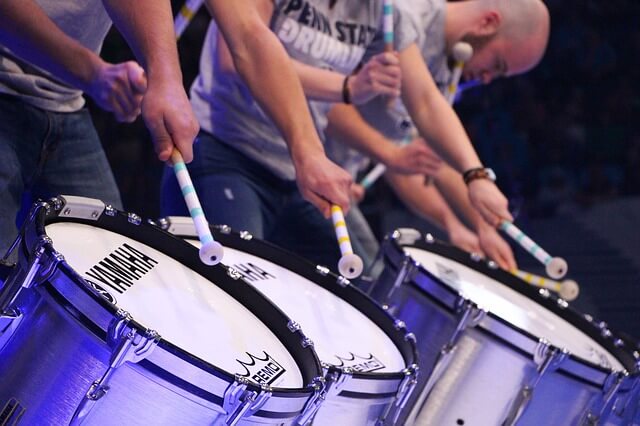 To learn these motions, musicians must isolate different parts of their body to practice distinct movements, as well as engage their entire body to actually play the instrument. Developing these fine motor skills also helps strengthen connections between the hemispheres of the brain.
To learn these motions, musicians must isolate different parts of their body to practice distinct movements, as well as engage their entire body to actually play the instrument. Developing these fine motor skills also helps strengthen connections between the hemispheres of the brain.
Playing an instrument offers other health benefits as well. Playing a wind or brass instrument trains your breath control and engages your core muscles. Most musical instruments also require good posture to play them properly, which can improve back health and reduce back pain. Some musical performances may even provide an excellent physical workout — think about the last time you went to a rock concert and watched the drummer and lead guitarist leave the stage dripping in sweat.
8. Boosts Self-Esteem
Learning a new skill can also help build your confidence. When you finally perfect that song or solo on your new instrument, you enjoy a sense of accomplishment and pride. The more you grow as a musician, the more confident you will become in your skills and talent — and the best part about the feeling of achievement you get from mastering a piece of music is that there is always another song to learn or solo to challenge you even more.
Performing music can take this confidence boost to the next level. After jamming out at your first open mic night or performing your first solo during a jazz concert, you will feel great knowing you have done something impressive — and the audience’s roaring applause doesn’t hurt either.

9. Expands Your Social Network
Although learning an instrument is something you have to do on your own, being a musician can significantly expand your social circle and build new connections. Not many people can call themselves musicians, but once you master an instrument, you can join this elite demographic of people with musical abilities. You’ll find yourself chatting about guitar riffs with new friends or bonding over your favorite brand of oboe reeds.
Playing a musical instrument allows you to start a band with friends who share your musical style or play together for fun after work. Playing a musical instrument also opens up other opportunities to expand your social network, such as performing in a pit orchestra at your local theater or marching in a parade. When you play music with friends, you build relationships that can last a lifetime.
10. Relieves Stress
Listening to music provides relief from everyday worries and helps people recover more quickly after stressful situations. Performing music can provide the same benefits of reducing daily anxiety and making worries disappear.
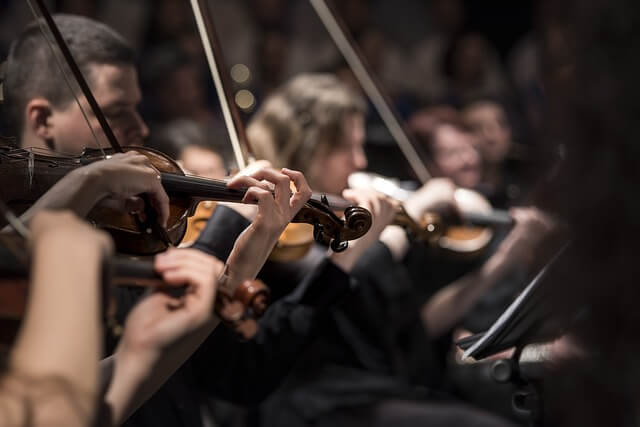 A study published in the International Journal of Music Education compared the stress-relieving abilities of playing the piano to writing calligraphy and molding a piece of clay. The results showed playing the piano had the most significant impact on reducing stress levels than the other creative art activities. Playing piano also resulted in dramatic reduction in anxiety levels, measured by State-Trait Anxiety Inventory scores taken before and after participating in the creative activity.
A study published in the International Journal of Music Education compared the stress-relieving abilities of playing the piano to writing calligraphy and molding a piece of clay. The results showed playing the piano had the most significant impact on reducing stress levels than the other creative art activities. Playing piano also resulted in dramatic reduction in anxiety levels, measured by State-Trait Anxiety Inventory scores taken before and after participating in the creative activity.
So, how does playing an instrument relieve stress? Playing a musical instrument requires concentration and focus, which takes your mind off other concerns. When you get caught up in the song you are playing, you forget about your bad day at work or endless to-do list. Listening to the beautiful music you produce can also be calming and relaxing. Playing upbeat music can reduce stress by lifting your mood and renewing your energy.
Playing a musical instrument is also just plain fun. It’s enjoyable to hear music you love, and even more enjoyable to produce that music yourself. These mental benefits of learning and playing an instrument make it well worth the time spent learning how to make good music.
Which Instrument Offers the Most Benefits?
If you are ready to start enjoying the mental and health benefits of playing an instrument, the first step is to pick which instrument you want to learn. Playing any instrument can improve brain functioning and overall well-being, but different instruments will offer slightly different benefits.
If you want to develop your fine motor skills the most, choose an instrument that is technically challenging, requiring coordination between both hands and using intricate fingerings. If you want to play music to relax, pick an instrument like the piano that is fairly easy to learn and produces a calming sound, rather than one like a clarinet that will likely produce a lot of squeaks when you are first learning how to play.
The benefits you experience from playing a musical instrument also depend on how you use it. If you challenge yourself to memorize scales and songs, you will boost the memory benefits of playing an instrument. If you get on stage at an open mic night, you will build your self-esteem and sense of achievement.
The instrument that offers the most benefits to you will be the one you like playing the most and will continue playing for a long time in the future. A great way to discover your favorite musical instrument is to consider the style of music you like to hear and which instruments sound best to you. You can also shop local and used first to try a few different instruments and find one that you love.
Used Musical Instruments From Record Head
Record Head is your local Milwaukee music store carrying a wide variety of new and used musical instruments. Whether you are looking for a used electric guitar or shiny new saxophone, we’ve got you covered. Our inventory includes affordable models of string instruments, keyboards, percussion instruments, drum sets, and more, so you can enjoy the benefits of playing an instrument with very little investment. Visit our showroom in West Allis to test out a musical instrument today!
